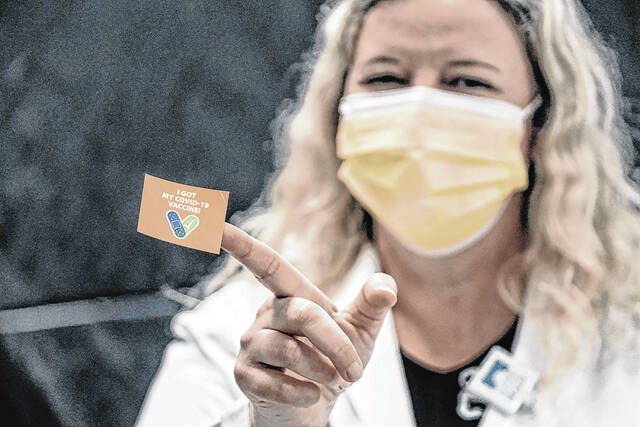
Pictured: Clinical Pharmacy Coordinator Chris Soedel shows the COVID-19 vaccine sticker like ones she handed out to people who received the Pfizer-BioNTech COVID-19 vaccine Dec. 17 at a Columbus Regional Health facility. Mike Wolanin | The Republic
Columbus Regional Health has suspended its efforts to comply with a federal COVID-19 vaccine mandate for healthcare workers while a challenge to the requirement makes its way through the court system.
CRH officials said Monday they were “in a holding pattern” just two weeks after the hospital system and Schneck Medical Center in Seymour announced that they would require all employees, medical staff, students, volunteers and contractors to be fully vaccinated by Jan. 4.
The federal mandate, issued last month, requires healthcare facilities that receive funds from the Medicare and Medicaid programs to ensure all employees are vaccinated by Jan. 4, a measure that would affect millions of workers across the country, including at least 3,300 in the Columbus area.
Health care facilities that do not comply with the federal requirement risk possible payment denials and termination from the Medicare and Medicaid programs. More than half of all patients at CRH and Schneck are covered by one of the two federal programs, the hospitals said in a joint statement on Nov. 23.
But just days before the first deadline in the mandate, a federal judge in Louisiana last week issued a preliminary injunction to block the mandate from taking effect.
The legal challenge was brought by several states — including Indiana — and the order came one day after a federal judge in Missouri issued an injunction in a similar lawsuit filed by other states.
Sunday would have been the deadline for workers at CRH and Schneck to submit proof that they have received their first dose of a two-dose vaccine, the single-dose Johnson &Johnson or apply for an exemption, according to the joint statement from the hospitals.
“Our work with the (Centers for Medicare and Medicaid Services) requirement has been suspended because of that,” said CRH spokeswoman Kelsey DeClue. “…We’re kind of in a holding pattern right now. We’re not really able to move forward with that work until we know where the CMS requirement stands in the courts, and so those deadlines that we were originally working with, those have changed or will change depending on where this goes in the courts.”
Currently, it is unclear if Schneck Medical Center has also pressed the pause button. A Schneck spokesperson did not respond to a request for comment but previously said “we will follow the regulations that are set forth by CMS. Whatever they decide is what we will follow.”
The recent legal challenges have thrust hospitals into the midst of a legal fight that is brewing across the country over the extent to which the federal government can force healthcare facilities and businesses to require staff to get vaccinated.
They also come as local COVID-19 infections and hospitalizations are soaring, reaching levels not seen in nearly 11 months as health officials fear another tough winter is on the horizon.
The lawsuit, which lists Indiana Attorney General Todd Rokita as a plaintiff, argues that the Biden administration is “straining to justify an unjustifiable and unprecedented attempt to federalize public health policy and diminish the sovereign States’ constitutional powers.”
However, the Biden administration and public health experts say that vaccine requirements are legal, prudent and necessary to help the country emerge from a pandemic that has killed more than 700,000 people in the United States, including hundreds in the Columbus area.
This past Tuesday, U.S. District Judge Terry A. Doughty wrote in a memorandum ruling granting the preliminary injunction that “there is no question that mandating a vaccine to 10.3 million health care workers is something that should be done by Congress, not a government agency.”
“It is not clear that even an act of Congress mandating a vaccine would be constitutional,” Doughty added.
Adding to the uncertainty, Indiana passed legislation in April that prohibits state or local governments from issuing or requiring COVID-19 vaccine passports, which generally are documents that show people were vaccinated against COVID-19 or recently tested negative for the virus, The Associated Press reported.
CRH is a county-owned hospital.
“As an organization, we are stuck in the middle of this,” DeClue said. “We want to do the right thing for our patients. We want to do the right thing for our workforce. We understand there are a lot of complicated factors that play into this process, and we understand all the varying sides of it. And I think all of that together just makes this a very complicated process and decision-making position that we are in.”
Vaccine requirements are not new in the medical field. For instance, CRH requires staff to be vaccinated against certain illnesses as a condition of employment — including influenza, tuberculosis and hepatitis — but allows for certain exceptions due to medical or religious reasons, hospital officials said.
CRH, which employs about 2,200 people, said just more than 70% of its staff was fully vaccinated against COVID-19 as of Nov. 15. Schneck, for its part, employs about 1,100 people, with more than 70% who were fully vaccinated as of the end of September.
That means potentially up to 660 workers at CRH and up to 330 at Schneck remain unvaccinated.
In the meantime, CRH is “continuing to encourage our employees to get to get the vaccine on their own” as the legal battle plays out, DeClue said.




